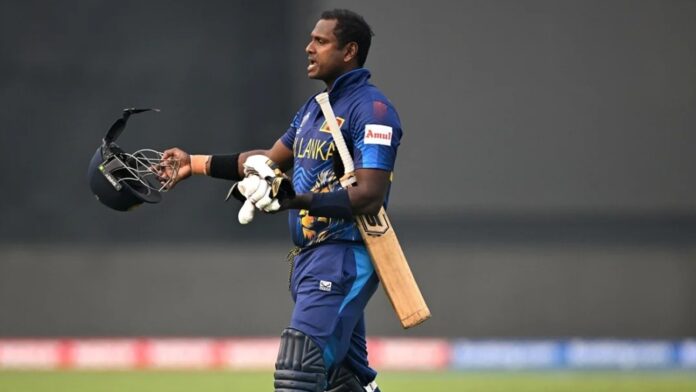A remarkable and controversial incident unfolded at the 2023 World Cup match between Sri Lanka and Bangladesh at the Arun Jaitley Stadium, sparking debates and ripples across the cricketing world. Angelo Mathews, the former Sri Lankan skipper, faced an unprecedented dismissal labeled as “Timed Out” following an appeal by Bangladesh captain Shakib Al Hasan.
The uproar erupted when Mathews failed to face the next delivery after the dismissal of Sadeera Samarawickrama. An appeal by Shakib citing Mathews’ delay led to the “Timed Out” decision, triggering heated commentary from Mathews, criticizing the fourth umpire and condemning Shakib’s actions as “disgraceful.”
In response to the controversy, the Marylebone Cricket Club (MCC), custodians of cricket laws, clarified the events surrounding Mathews’ dismissal. They emphasized the critical aspect of the law where the incoming batter must be ready to face the ball within two minutes of the previous dismissal or retirement. In Mathews’ case, it was determined that he hadn’t readied himself within the stipulated time frame, leading to his dismissal.
“Had the umpires been informed of a significant, justifiable, equipment-related delay within the two-minute allowance, they could have treated it as a new type of delay (as they would when, for example, a bat breaks), possibly even calling Time, allowing for a resolution of that delay without the batter being at risk of being Timed out. However, it is important to note that both umpires determined the delay came after the two minutes had elapsed and that Time had not been called before the appeal,” MCC explained.
The crux of the decision lay in Mathews signaling for a spare helmet when his chin strap malfunctioned, failing to inform the on-field officials. MCC acknowledged that if the umpires had been informed about this equipment delay within the allowed two minutes, they could have treated it as a distinct form of delay, potentially avoiding Mathews’ dismissal. However, the delay was observed after the two-minute period had lapsed, leaving the umpires no choice but to uphold the “Timed Out” decision.
Disputing the claim that he exceeded the time limit, Mathews took to social media, presenting “video evidence” suggesting he had “5 more seconds.” However, MCC’s detailed analysis clarified that Mathews’ arrival at the crease and the subsequent helmet malfunction significantly exceeded the allocated time for readiness, warranting the umpires’ decision.
The detailed breakdown by MCC highlighted the sequence of events, citing Mathews’ delayed arrival, signaling for equipment without consulting the umpires, and the subsequent timing, leading to his delayed readiness on the field.
“Having taken more than 90 seconds to get to the 30-yard circle, Mathews appeared to notice that he was short on time, jogging the final few yards to the wicket. His helmet malfunction has since been shown to have taken place 1 minute and 54 seconds after the previous wicket had fallen. He had not, at this stage, begun to take guard and was not close to being in a position to receive the ball,” MCC Explained.
When the helmet broke, it appears that Mathews did not consult with the umpires, which a player would be expected to do when seeking new equipment. Rather, he just signaled to the dressing room for a replacement. Had he explained to the umpires what had happened and asked for time to get it sorted out, they might have allowed him to change the helmet, perhaps calling Time and thus removing any possibility of being Timed out. Given that Time had not been called and that, at the time of the appeal, more than two minutes had elapsed, the umpires correctly gave Mathews out. In fact, there was no other action for the umpires to take within the Laws of Cricket,” the statement explained.






















